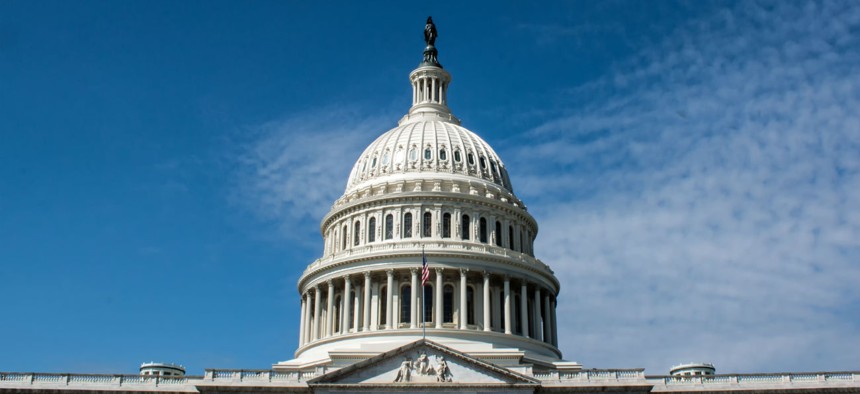
By RC Reid Photography / Shutterstock.com
White House, Democrats Reach Deal to Provide Paid Family Leave to Feds
A tentative agreement on the fiscal 2020 National Defense Authorization Act would provide all federal employees with 12 weeks of paid family leave each year.
The Trump administration and congressional Democrats reached a tentative deal late last week to provide all federal employees with paid family leave, marking a culmination of years of advocacy on the issue.
According to a congressional source familiar with negotiations, the White House agreed to support the provision as part of the fiscal 2020 National Defense Authorization Act, in exchange for Democrats’ acquiescence on the establishment of the U.S. Space Force as an independent branch of the armed services.
Earlier this year, the House version of the authorization act included the text of a bill introduced by Rep. Carolyn Maloney, D-N.Y., which would provide 12 weeks of paid leave to federal employees for the birth, adoption or fostering of a child, or to help care for a child, parent or spouse with a serious medical condition. For years, Maloney had unsuccessfully advocated for parental leave in the form of six weeks for the birth or adoption of a child, but expanded both the scope and amount of leave in this year’s bill.
The agreement appears to provide 12 weeks of paid leave for the birth, adoption or fostering of a child, but not the provision allowing for the care of an ailing loved one.
According to The Wall Street Journal, which first reported on the deal, in exchange for the leave bill’s inclusion, the Defense policy measure will establish the Space Force as a separate military service branch within the Department of the Air Force, akin to the Marine Corps’ relationship the U.S. Navy.
“This will be a crucial win for federal employees and their families and a significant development in our ongoing fight for comprehensive paid family and medical leave for all Americans,” Maloney told the Journal.
Currently, federal workers must take unpaid leave or paid annual leave to take time off after becoming a new parent or to care for an ailing loved one. Military service members, by contrast, already may take up to 12 weeks of paid leave to care for a new child.
In a statement, National Active and Retired Federal Employees Association President Ken Thomas applauded the deal, which advocates say will actually save the government money because of the high costs associated with recruiting new employees.
“This policy is not only about the value we place on family, but also smart human resource management,” Thomas said. “The bonding time it affords federal employees with a new addition to their family is priceless, as is the government’s ability to recruit and retain top talent and a high-performing workforce that best serves the American people. With every other industrialized country providing paid parental leave to citizens, and America’s top 20 companies offering some amount of it to their employees, this policy is long overdue, but no less important.”
American Federation of Government Employees National Secretary-Treasurer Everett Kelley described the agreement as a "watershed moment."
"AFGE has been fighting to provide all federal workers with paid family leave for decades, and the provision in this year’s National Defense Authorization Act is a large step in the right direction for full family leave," Kelley said. "The hard work by our members is finally beginning to pay off. This new paid benefit will help federal employees better balance their work and home lives, and it will give agencies a needed advantage when recruiting and retaining workers to carry out critical missions on behalf of our country."
National Treasury Employees Union National President Tony Reardon applauded the inclusion of parental leave, but said Congress should continue to work to expand the program to include paid leave to care for an ailing loved one.
"The U.S. government is a large employer and should be a model employer. Instead, the government continues to lag behind, which makes public service a less desirable option,” Reardon said. “Let’s get the paid parental leave program in place and move swiftly to expanding it to paid family leave.”
The House is expected to vote on the compromise version of the Defense authorization bill later this week.
This story has been updated to clarify the scope of the compromise leave provision and to include additional comment from employee organizations.
NEXT STORY: Last Chance for Open Season







